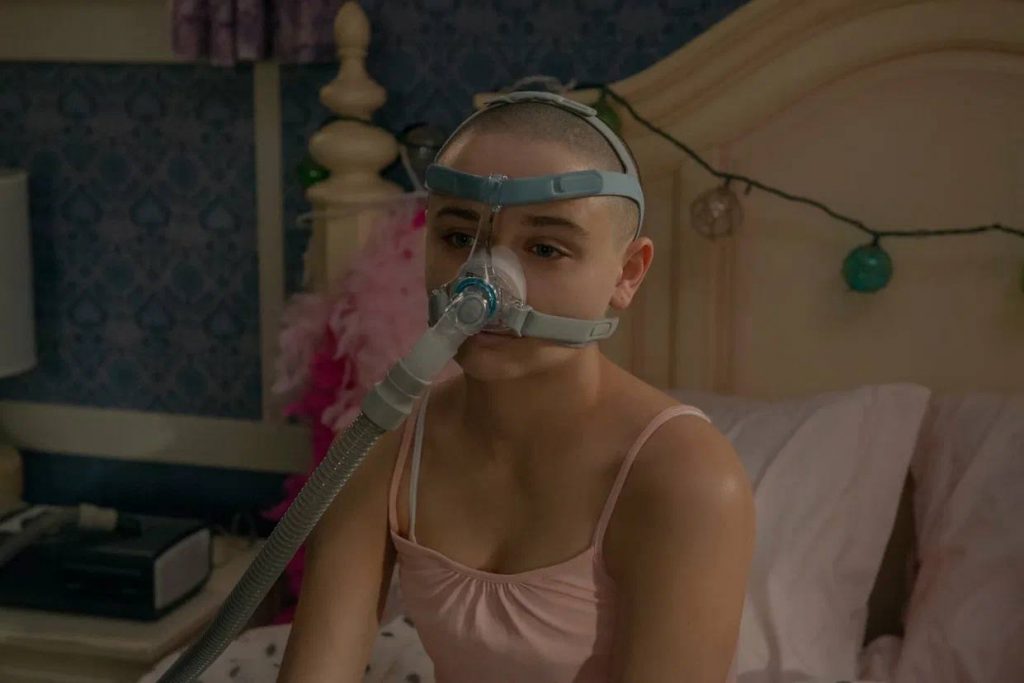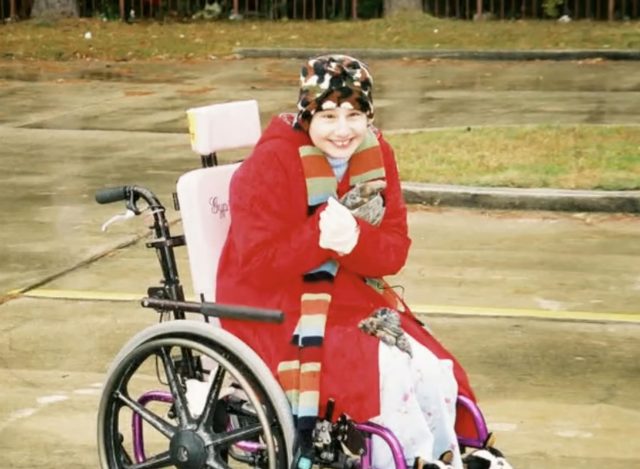Many of us invented our own illnesses in childhood to avoid going to school. But as adults, we try to stay away from the doctor’s office as much as possible. And only when serious problems begin do we begin to regret how careless we were with our bodies. However, there are people who are not only focused on health, but are literally obsessed with reading medical reference books and describing all sorts of ailments. And sometimes not only at home.
This is the heroine of the series “Pretend”, the plot of which is based on a true story that happened in Missouri in 2015. Claudine “Dee Dee” Blanchard believed that her daughter Gypsy Rose was terminally ill, when in fact she was completely healthy. The woman literally crippled her own daughter, kept her locked up and filled her with drugs for asthma, leukemia, muscular dystrophy, mental retardation and a bunch of other diseases. Unfortunately, Claudine herself suffered from a mental disorder called inherited Munchausen syndrome.
Especially for The Fashion Vibes, psychologist Elena Yarikova told by what signs Munchausen syndrome can be recognized, why it occurs and how to treat it.

Elena Yarikova, psychologist
What is Munchausen syndrome?
Munchausen syndrome is a mental disorder that manifests itself with pseudo-diseases. A person who receives such a diagnosis imitates diseases of various etiologies and seeks medical help that he does not actually need. “Patients” get so used to this role that they are ready to take unnecessary medications and even undergo surgery.
The concept of “Munchausen syndrome” was introduced by the English endocrinologist Richard Usher in 1951. The phenomenon was named after Baron Munchausen, who was famous for making up incredible stories about himself.
It is not so easy to define this category of people. The difficulty lies in the fact that patients seek help from different specialists to facilitate the invention and completion of the story with various complaints and symptoms. Patients deceive doctors and even cause physical harm to themselves to convince themselves.
Why does Munchausen syndrome occur?




People with Munchausen syndrome suffer from a feeling of loneliness and abandonment. What forces a person to resort to such deception is the desire to feel needed. Typically, this behavior is observed in dysfunctional and single-parent families, as well as in those raised by cold and indifferent parents who do not care about the mental and physical condition of the child.
The main cause of mental disorders is behavioral patterns learned from childhood. That is, once a child’s illness forced parents to change their usual behavior and show interest in him. Such a person begins to repeat a learned behavioral pattern from an early age, because a destructive association is ingrained in his mind that attention and love can only be obtained by getting sick. You can pay attention to how children feign illness so that parents will put aside their work and focus on them. Typically, such a cause-and-effect relationship occurs with age, in the process of growing up and taking responsibility for oneself and one’s life. The problem continues for those who are stuck in a childish position, that is, in order to feel good, self-sufficient and needed, a person needs to seek approval from the outside, while he has no support from within.
The secondary benefit of this “complex disease”, which has a long course, is that others begin to treat such a person more tolerantly and understandingly, and the “patient” himself receives the status of an “eternal martyr.” Therefore, being in a prosperous and prosperous situation is absolutely not profitable for him, and he constantly declares that he is again experiencing a bad period in his life.
Patients with Munchausen syndrome are very good at delving into medical history and supporting their complaints with medical jargon to make them sound more convincing. Moreover, the choice of doctors will be made solely on the basis of sympathy: the patient will turn to the one from the medical staff who is more attentive to problems and discomforts. If the “patient” sees indifference to his illness, he will immediately change doctors, citing incompetence.
How do you know if someone has Munchausen syndrome?



There are usually several specific signs. It all depends on the degree of the disorder and the goals the person pursues. Here are some of them.
– The list of unrelated diseases is very long.
– Pains and symptoms that are not characteristic of the so-called disease.
– The person becomes confused, forgets what he or she was told about the disease, and new symptoms appear.
– Sabotages treatment. For example, when specific actions are required, such as surgery, the patient finds reasons to refuse preoperative examination.
– Trying to harm yourself to justify your grievances.
Is it possible to treat Munchausen syndrome? And how to help relatives with such a disorder?
The main goal of treatment is for the patient to realize that there is a problem, and this can be very difficult because the behavioral model is learned: the person gets used to receiving the necessary attention only in this way. In most cases, people with Munchausen syndrome refuse to accept that their illness is fake, which means that the desire of others to come to help is sabotaged in every possible way. It should be remembered that underestimating the “patient’s problems” in this case is a very aggressive and painful perception, so you need to act as sensitively and gently as possible.
But before the correction process can begin, the person must recognize that there is a problem. It is recommended that healthcare professionals treating a person with Munchausen syndrome keep communication to a minimum, especially if the doctor has doubts that all instructions are being followed.
In the case of your loved one, you should carefully guide the person to understand the problem, without pressure or accusation. The situation is more complicated when the carrier of such a syndrome is a parent, because here we are talking about Munchausen syndrome with delegation. It occurs more often among parents, or rather, among single mothers who are sure that treatment is needed for their completely healthy child. Such difficult patients attach their children to themselves in order to feel needed, imposing on them the idea that children cannot cope without care and treatment. As can be seen in the case of Gypsy Rose and her sick mother Dee Dee Blanchard, the child’s psyche suffers the most from this.



In the series, we see that a young girl is actually held hostage by her mother, to whom she has conflicting feelings. On the one hand, she is afraid of upsetting her mother and experiences fear and anger towards her, on the other hand, in some cases, she feels sorry for the mother who starts to cry when she scolds her, which causes her daughter to feel guilty. The worst thing is that others can live with such a family for years and not realize that the child is being held hostage. After all, the child is isolated from other people, and the world around him is dangerous for him. In addition, he does not have enough close relationships with anyone outside the house. Another interesting point is that such families, as a rule, live on social assistance: after all, the family of Gypsy Rose and Dee Dee Blanchard could lose their home if the deception was revealed. This situation also makes the child feel helpless.
Psychiatrists treat Munchausen syndrome. And there is no single effective method yet. The patient must be under close medical supervision to prevent harm to himself and his loved ones.
Source: People Talk
Errol Villanueva is an author and lifestyle journalist who writes for The Fashion Vibes. With a passion for exploring the latest trends in fashion, food, travel, and wellness, Errol’s articles are a must-read for anyone interested in living a stylish and fulfilling life.





